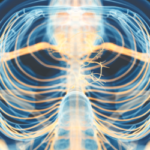How do we take this knowledge forward to make a difference for patients with RA, nearly half of whom, asked Dr. Tak, are currently suffering from active disease? The bottom line, according to all three researchers, is to acknowledge this new view of the immune system. “Before, we tended to think about immunity as a distributed, non-innervated network that functions autonomously,” said Dr. Tracey. The immune system must now be regarded as an “innervated organ,” in his words, and that innervation occurs through a hard-wired network. The bonus reaped from in vivo studies is that we now better understand how the nervous system is sensing and responding to inflammatory mediators. This knowledge can lead to development of logical therapeutic targets to down-regulate the inflammatory process. Dr. Tracey and his colleagues are investigating the utility of vagal nerve stimulation. Some alpha 7 agonists could perhaps selectively deliver the right message to down-regulate the proinflammatory process and ongoing investigations are also showing some promise for the use of such mind–body techniques as paced breathing for the same purpose.8
Whatever the method, targeted therapeutics will be the wave of the future, helped by the kind of “cross-talk” and cross-fertilization demonstrated by these three investigators.
Gretchen Henkel is a medical journalist based in California.
References
- Borovikova LF, Ivanova S, Zhang M, et al. Vagus nerve stimulation attenuates the systemic inflammatory response to endotoxin. Nature. 2000;405:458-462.
- Bernik TR, Friedman SG, Ochani M, et al. Cholinergic anti-inflammatory pathway inhibition of TNF during ischemia reperfusion. J Vasc Surg. 2002;36: 1231-1236.
- Wang H, Yu M, Ochani M, et al. Nicotinic acetylcholine receptor alpha7 subunit is an essential regulator of inflammation. Nature. 2003;421:384-388.
- Sorkin LS, Moore J, Boyle DL, et al. Regulation of peripheral inflammation by spinal adenosine: role of somatic afferent fibers. Exp Neurol. 2003;184:162-168.
- Boyle DL, Moore J, et al. Spinal adenosine receptor activation inhibits inflammation and joint destruction in rat adjuvant-induced arthritis. Arthritis Rheum. 2002;46:3076-3082.
- van Maanen MA, Stoof SP, et al. The alpha7 nicotinic acetylcholine receptor on fibroblast-like synoviocytes and in synovial tissue from rheumatoid arthritis patients: A possible role for a key neurotransmitter in synovial inflammation. Arthritis Rheum. 2009;60:1272-1281.
- van Maanen MA, Lebre MC, van der Poll T, et al. Stimulation of nicotinic acetylcholine receptors attenuates collagen-induced arthritis in mice. Arthritis Rheum. 2009;60:114-122.
- Marsland AL, Gianaros PJ, Prather AA, et al. Stimulated production of proinflammatory cytokines covaries inversely with heart rate variability. Psychosomatic Med. 2007; 69:709-716.


